Book Reviews
Fiction
- All Fiction
- Adventure
- African American
- Chapter Books
- Chick Lit
- Christian
- Classics
- Contemporary
- Diversity
- Dystopian
- Erotica
- Fantasy
- Graphic Novels/Manga
- Historical
- Horror
- Humor
- LGBTQ
- Literature
- Medieval
- Mystery
- Mythology
- Native American
- Other Fiction
- Paranormal/Supernatural
- Picture Books
- Realistic
- Reluctant Readers
- Retold Fairytales
- Romance
- Science Fiction
- Short Stories
- Sports
- Thrillers/Suspense
- Time Travel
- Western
Nonfiction
Want to submit a book review? Submit your book review today.
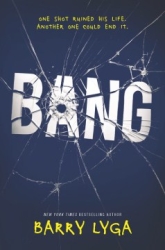
BANG is a novel about a 14 year old boy named Sebastian Cody, who has a dark secret. At the age of just four years old, Sebastian shot and killed his baby sister. Now, ten years later, he has to live with the guilt and horror of the past
When a Muslim girl, Aneesa, moves to Brookdlae and becomes a close friend and neighbor, Sebastian spends the entire summer with Aneesa, showing her around Brookdale when they eventually start a pizza making youtube channel. All this summer fun almost becomes an escape from suicidal thoughts. After school starts, Sebastian isn’t able to distract himself from his thoughts, now that he isn’t spending all day with Aneesa. After a few weeks at school, bullies start to poke and prod, and Sebastian eventually makes the decision to end it. His plan was to kill his father, (who had moved out, Sebastian thinking it was abandonment) and then himself.
Of course the book ends in a “happily ever after” way, but it still has that “good book feeling” when you are finished.This book is a really interesting story about Sebastian's thoughts, whether it be from the past, his friends, and his family life. One of the best singular books I’ve ever read, but don’t listen to me, go read it for yourself and find out.
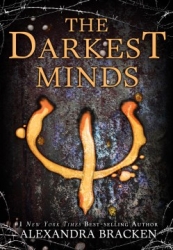
The Darkest Minds focuses solely on our main character, Ruby, a strong-willed, cautious girl who goes through major character growth and development throughout the book. Well, Ruby and the people she meets on her journey of staying alive when the world turns against teens due to a harmful mysterious virus that removed most of the child population. While Ruby did survive, she lost something almost as bad as her life, her parents. After being locked in a garage she was then sent to Thurmond--a brutal government rehabilitation camp of sorts that is far from its title by her own parents. On her journey, looking for stability she runs into Zu, a meek, sweet, and unsettled young girl around her age, presumably around 14. Chubs, the brains of the group and honestly incredibly mature, and finally Liam, a Southern seemingly fearless courageous leader. This memorable group of strong teenagers makes an impact that even they don't know they'll make in this book. I decided to read this book because some years ago when the movie came out I watched it with my brother and I loved it and wished that there was a sequel so I decided to read the entire series because I wanted some closure and I did not regret it.
What did you like about the book? I loved the well-written tight-knit teen relationships and slow-burn romance in this book. The personalities are pretty believable for the characters and I genuinely enjoyed the dialogue and internal thoughts that were portrayed.
There is a lot I like in this book, however of course there are some things I didn't like so much. For example, some events in the book feel a bit dragged out and some others are too short for the emotional weight of some situations that occur. Meaning they could use more explanation or information on the gravity of the event on people around them. If you're thinking "Hm, should I read this book? I would definitely say you should. I thought that this book was a nice read, especially on a day when It's raining and maybe it's later in the day. However, there are some situations that Ruby finds herself In that contain sensitive topics and I'd certainly recommend looking deeper into that on maybe a parental guidance website or another website of that sort if you have a sensitivity or trauma with that kind of thing that I will fail to mention in this review. Overall, The Darkest Minds Is a good read if you want a dystopian teen book with some romantic elements and combat elements. It reminds me of Divergent a bit however it is definitely its own thing and it has its sad moments but it is something you'd have to read on your own to really understand what it is like. When you start reading, you just can't put the book down at a certain point so it keeps your attention. Sometimes I wish I could read this book for the first time again, so make the most of it!
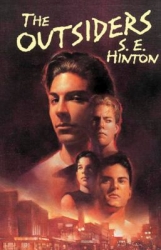
At first I didn’t want to read The Outsiders because at the time I didn’t like reading. But my language arts teacher was going to test us on it after winter break so I read it. When I read it I fell in love with the characters and felt like i belonged in the story. The book is about a town divided by wealth and status. The wealthy kids are called soc’s and the less fortunate kids are called greasers. The book tells the story of a greaser boy named Ponyboy Curtis who narrates the story. Ponyboy is the main character and he tells us about him and his gangs home lives and how they started as 7 friends and ended as 5 friends. Ponyboy lives with his two older brothers Sodapop and Darry. Ponyboy lives with his brothers because his parents died in an auto wreck 8 months before the story begins. As a result of their parents not being with them, Darry works two jobs to provide for his brothers, and Sodapop is a high school dropout who works full time at the DX gas station. The book has taught me a lot of good life lessons and I’m glad I read it. It’s my favorite book and because I read it I bought some of S.E Hintons other books.
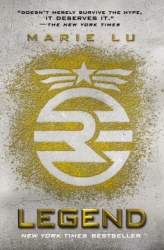
What was once known as the western half of the United States, is now known as a separate country called the republic, a plague-infested land at war with its eastern neighbors, the colonies. This book is an action filled adventure, going through the first person thoughts and actions of each character, let’s dive in.
The book starts out centered on a 15 year old boy named Day. Day is a national criminal after failing his trial (a test that all children have to take once their 10) and being a nuisance to the republic, downing fighter jets, and such. Each chapter switches between Day and June, already a military prodigy at the age of 15 years old. After Day steals plague suppressants from a hospital for his dying younger brother, he supposedly kills June's older brother, Metias, to escape. After June hears of this, she is desperate to avenge her brother's death, so she goes on an undercover mission in the slum sectors of Los Angeles, hoping to find information on Day. After coming across an illegal, underground fighting ring, (a skiz fight) she is pushed into the ring, where Tess (Day's acquaintance) saves her. Since Day and Tess' identities are unknown, June has no idea that Day is her savior, and travels around the city with them. After finding a clue that "the boy" is Day, Tess follows him and gives away his position to her superiors, leading to Day's capture. In the streets, the two became quite close, and Day told June that he believes the Republic uses the Republican people as lab rats for testing their plagues, before using them against the Colonies.
In conclusion, I think this book lives up to the review I gave it. I loved how every chapter ended with a cliffhanger, keeping the lights on late into the night. Definitely one of the best singular books I've ever read, but don't take my opinion, go read it for yourself!
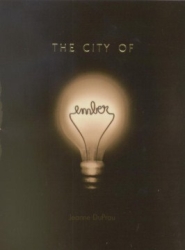
This book was super captivating as it was a search for truth and freedom. Throughout the book, we see the struggles of people in a dying city; the lights are running out, and the food is too. Through these problems, we see the attempts people make to survive, which lead to people stealing food and hiding it for themselves. Luckily two brave kids choose to find the truth and go on a journey to escape the city. When they finally find the light they realize their whole lives they were underground in the dark. A whole world was waiting for them at the top, but because no one was brave enough, they were stuck in their dying city. This book teaches us the importance of curiosity and the importance of hope; without these, people would be left to die in a dying city, never getting the chance to see the light.
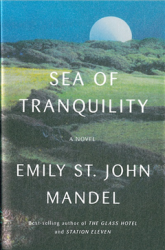
Science fiction often bogs itself down in the details of a potential future while forgetting the poetry that can come with the written word. It doesn't matter what scientific topic the book is handling if it's not entertaining to read. The best ones are a combination of speculative science, entertainment, and beautiful prose. I feel Sea of Tranquility meets these three criteria. The narrative is gripping, the framework thought-provoking, and the execution superb. I've never seen such a common sci-fi topic like this handled so well.
Time travel feels like it can be a crutch for a writer. It's a way to fill in details in a non-linear format that covers up any plot holes in a way that feels cheap. Jumping around in time can also make things confusing, as it isn't clear what era each section is set in. However, the way Emily St. John Mandel handles time travel in this book is probably one of the best I've seen. While following a linear timeline (somewhat akin to Cloud Atlas), the depth of time travel reveals itself with each jump into the future.
I think the reason I love how this book handles time travel is that each revisit of events adds layers of context that almost require an immediate second read-through of the entire book. Sure, the time travel explains away certain mysteries—but giving the reason behind those moments just elevates the story to higher levels. And throughout the whole thing, the descriptions, wording, and overall writing is just fantastic. Even if you don't like science fiction, this book stands out as a well-written piece of work that dives deeper into how humans can't ever know the full extent of a moment from a singular perspective.
The best time travel book I've ever read, I give Sea of Tranquility 5.0 stars out of 5.
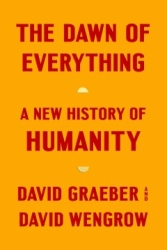
Every once in a while, I come across a book that feels like it's way above my head, but changes how I think about the world. Their analysis calls into question the known understanding of something and references plenty of famous individuals who have written on the topic. Unfortunately, a neophyte like myself does not know who any of these people are. The Dawn of Everything is very much one of these kinds of books for me.
Not knowing much about anthropology or ancient human civilizations, I came in with an open mind and found some intriguing points put forward in this book. We often look at history through modern lenses, but how often are we merely adopting the modern lenses of those before us? If the common thinking cannot support the physical evidence, should we continue to believe it? I learned a ton by reading this book, and I don't even feel like I was grasping everything that it was trying to convey because I wasn't as intimately familiar with the standard model it was trying to deconstruct.
While I think The Dawn of Everything can be approachable for anyone looking to educate themselves about how humans used to interact, it suffers from being occasionally overly academic. There are tons of examples brought forth in this text that merely reinforce the main thesis, each time trying to discredit some previously held belief that I wasn't aware existed until I read it for the first time here. At a certain point, it gets redundant. Still, there were many ideas it presented that made sense enough for me to consider that the authors were onto something big.
A mildly bloated re-thinking of the structure of early human societies, I give The Dawn of Everything 4.0 stars out of 5.
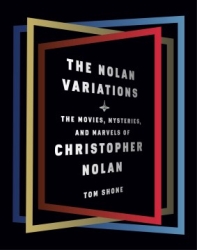
Anyone who has met me knows I am a huge fan of Christopher Nolan's movies. His ability to provide a psychological, mind-bending narrative has kept me engaged for decades. It only makes sense that I would then read the pseudo-biography / interview, The Nolan Variations. Tom Shone's writing style feels intimate and personable in a way that made me feel closer to Christopher Nolan after reading this book. Whether or not you like his films, The Nolan Variations is important to get into the headspace of this acclaimed director.
The Nolan Variations dives into each one of Nolan's films, starting with Following (1998) and ending with Tenet (2020). That it provides hints of his Oscar-winning next film, Oppenheimer (2023) is really quite prescient. Unfortunately, this is also the one weakness of such a book. While it covers everything up to Nolan's peak, unless there's a "Volume 2" of this book, there will always be key elements of his filmography missing. Sure, it's interesting to see how he got here, but what happens next? Where does he go from here?
The casual way in which Shone reveals these deep insights into Nolan's mind is truly the best part of The Nolan Variations. I learned so much about Nolan's thought process, and a deeper understanding of each one of his films. That there's still some ambiguity in the endings of his movies even after reading this book just goes to show how talented Nolan is at crafting true head-scratching cinema. If you want the most thorough, behind-the-scenes look into 11 of the best movies to come out of the last three decades, then this is the book for you.
A relatable look into the mind of this generation's best director, I give The Nolan Variations 4.5 stars out of 5.
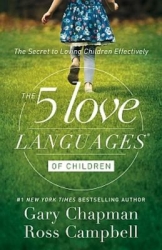
Say what you will about any of the "personality type" analyses out there, but being able to categorize an individual can help to understand them. Whether it's Myers-Briggs, Enneagrams, or the 5 Love Languages, being able to relate to a grouping that helps explain a personality is a great way to find an identity. These may all be pseudoscience, but they're harmless if used in the right ways. The 5 Love Languages of Children helps identify how these personality traits show up in kids.
As a parent, I found this book immensely useful because it revealed what the major (and minor) love languages of my two children are. Knowing how to best fill their "love tank" has helped my wife and I to manage our time with our kids. Knowing how these love languages may change as our kids grow up is just as useful as knowing that they need some of all the types (Gifts, Words of Affirmation, Quality Time, Acts of Service, and Physical Touch). After all, parenting kids who feel loved seems to be a much easier task than parenting kids who feel neglected.
With this personality type analysis, there's always a caveat. No single individual will fall entirely into a single category, and these categories may change over time. Still, it's fun to see my kids light up when they receive the love language they most identify with. Not only do I feel the 5 Love Languages are useful in understanding ourselves, but knowing how others (i.e., our spouses and children) receive love is important to growing these key relationships in our lives.
A useful tool to help parents love their children more effectively, I give The 5 Love Languages of Children 4.0 stars out of 5.
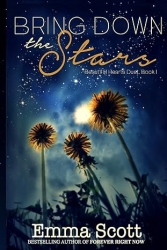
I'm not sure where I picked up this book on Kindle, but it finally took me two years to finish it (I'm excruciatingly slow at reading eBooks). To expand my horizons, I thought reading a romance novel would be good for me. Bring Down the Stars feels like a classic partly due to its heavy resemblance to Cyrano de Bergerac. Its tropes feel solidly planted in the genre, even to the point of being almost timeless. Still, the characters are a little frustrating.
When I finally sat down to focus on reading this book, it hooked me pretty well. The writing is beautifully poetic—which is most often seen from the male point of view (POV). The female POV was a good counterpoint to give the reader both sides of the story while also making the miscommunication between these star-crossed lovers a buildup to either passionate love or a complete destruction of the friendship. That dance between the two is likely what keeps people coming back to this genre. I get it now. It's maddening, but I get it.
I found the modern elements interesting because they could have easily been swapped out for similar situations in centuries past. As I mentioned above, this is basically a Cyrano re-telling, but with two athletic college students in love with the same farmer's girl. Which war the men went off to is irrelevant, as it could have just as easily been the American Revolution or Civil War. It frustrated me that there wasn't a conclusion in this book, as it would have been easy to accomplish without the need for a second book. If I feel up to exploring the genre again, I might pick that sequel up.
A modern take on a classic romance, I give Bring Down the Stars 3.5 stars out of 5.
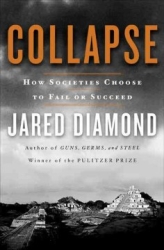
In doing research for book based on the Ancient Puebloan society that used to inhabit the Mesa Verde cliff dwellings, I came across this book. Collapse: How Societies Choose to Fail or Succeed was an eye-opening examination of the factors that can lead to the destruction of a society that could have continued being successful if it weren't for poor resource management. What's frustrating is seeing some of these things becoming prominent in modern society, 20 years after Jared Diamond wrote this book.
While the book covers some case studies where the society identified the problem and moved to fix it, some examples Diamond gives are based on speculation—which one has to do with limited information surviving from those eras. And even though there is an emphasis on environmental factors, sometimes a string of bad years of drought is just the luck of the climate. Unfortunately, while there were hopeful stories of communities who turned away from their destruction, these examples all had one thing in common: the leaders chose to save their society.
I appreciated how relatable Diamond made this text. It wasn't overly academic, but it provided enough details to weave a story that was easy to follow. The cause-and-effect scenarios he presented made sense and provided sensible explanations that the limited data set appears to support. The problem is, even with this knowledge, seeing the path our current society is headed down does not instill the confidence that humanity has what it takes to save itself at the individual level. Of the societies on the brink that survived, their leadership needed to step in to stop the poor resource management. When there's no financial motivation to save the world, the current system seems on track to collapse sooner rather than later.
An approachable and eye-opening look at the factors that brought down empires, I give Collapse 4.0 stars out of 5.
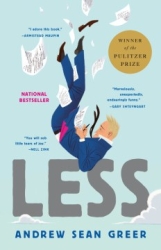
As I work my way through the Pulitzer Prize-winning novels, I'm finding the modern ones hold up a lot better under scrutiny. There's usually some eye-opening element from a marginalized group, which is partly why these are important novels to recognize. For its time, I'm sure Less came off edgier than today because of the wider acceptance of LGBTQ+ characters. Still, the writing in this book is deserving of its Pulitzer status not because of the main character's sexuality, but rather by the humor and humanity present in these pages.
The odd thing is that I don't think a book like this would work quite as well with a straight protagonist because they basically fall into all those same "woe is me" tropes that loser white guy main characters exhibit in a lot of literature. Yes, Arthur Less can't commit to a relationship. Yes, he's avoiding accomplishing the things he's good at because he's having a midlife crisis. That he's gay actually makes things more relatable. It doesn't matter which gender men choose to love, they all have these problems—for better or worse.
I think the most surprising element of Less is its humor. I still recall some of the best written punchlines almost 5 months later (Volcano? It's closed). That the author uses the humor to lighten the depressing side of this book's plot is a godsend. Life is full of missed opportunities and burned bridges, so framing these situations with the soft blanket of humor helps make them more heartfelt. Even amongst all the exotic locations, the one common denominator is the individual who is there, trying to run from themselves. It doesn't get any deeper than that.
A humorous and heartfelt look at the midlife crisis of all men, I give Less 4.5 stars out of 5.
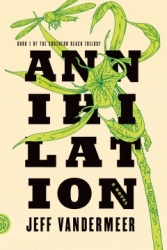
Having already watched the 2018 movie adaptation of Annihilation , I knew going into this book that it would be quite the trip. My expectations were mostly set on what was going to happen in this book, but not on how the author would convey these events. I was pleasantly surprised with something that felt just as disorienting. Told in the first-person perspective, Annihilation messes with the concept of an unreliable narrator in a way that I haven’t ever seen before. The real question is whether I understand anything now that I’ve seen the movie and read the book.
There’s a melancholy present in Annihilation that almost borders on nihilism. The way the main character seems to float through this world, carrying her trauma and relational scars around in an eerily monotonous and emotionless manner, is both unsettling and oddly comforting. Was this her attempt at obtaining closure? Did she want to find somewhere she truly belonged? Whatever the reason, she is propelled forward by forces outside her control, and she doesn’t resist any of the alien influence.
The prose in Annihilation is truly the star of the show here. Other writers might try to take a more scientific approach when dealing with aliens, but VanderMeer leans into the disorienting nature of Area X. I’ve been drunk a few times, but never high enough to hallucinate like this. Several times I had to stop and re-read a page to understand what was happening. Once I turned my mind off and let the words flow through me, I had a much more enjoyable time in this book. I don’t know if I’ll get through the rest of the trilogy, but this one was worth the read.
A trippy hallucination of a novel, I give Annihilation 4.0 stars out of 5.
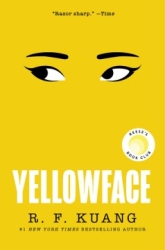
There are plenty of books with authors as the main character, but Yellowface feels like the first time that the struggles have been expressed in such a realistic way. Most author protagonists seem to exist in this vacuum where nobody else in their close circles shares their love of writing and publishing stories. They have no network with other authors or can commiserate over another rejected manuscript. And while Yellowface takes a bold approach to addressing diversity in the publishing world, it still ultimately paints the main character as a villain.
One cannot overemphasize social media's effects on the modern publishing landscape. Anything authors can do to break through the noise, they’ll attempt just to get more traction to sell their book. Tons of talented authors are overlooked for a variety of reasons, but Yellowface asks whether pursuing marginalized voices has created the unintended consequence of marginalizing the voices that used to be promoted. The frustration is real, but Juniper’s actions are not the answer. The thrill of Yellowface’s plot is how long she’s able to get away with it before she’s caught and tried in the square of public opinion.
As an author, a lot of this book made me feel seen. We always tell ourselves that our fellow writers are not competition, but it’s difficult to see others succeed when our own works go unnoticed. Jealousy is real, but we work through it and celebrate with our fellow authors so that someday they can come alongside us and celebrate our victories as well. Even if the ending gets a little weird, the way R.F. Kuang gives an intimate look into this community of writers feels authentic enough to be a universal experience for most authors.
A gripping, tongue-in-cheek examination of author rivalry, I give Yellowface 4.5 stars out of 5.
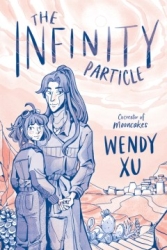
The Infinity Particle is about a futuristic world where humans have colonized Mars and have advanced technology. Clementine is a young girl who has just moved to Mars to get a start at a new life. She is working with her hero, as she is one of the most talented people to work in the field of robotics. On her first day, her and her personal robot SENA meet Kye, a personal humanoid robot built by Clem’s hero. Soon, Clem finds out her hero is not who she believed her to be, and Kye is malfunctioning. Clem and Kye have to work together to solve this mystery, and in doing so, they unearth both Clem and Kye’s troubled pasts, and they grow closer together. It’s a great book!
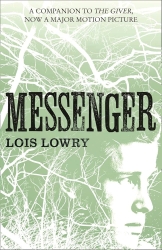
Continuing the passionate Giver series, Lois Lowry’s masterpiece “Messenger” is a book for the ages. As Matty, the lovable child from Kira’s town, has grown and changed in his new home, Village, his home has begun to change with him. Village is a place of acceptance and supports all that come to live there— or was, until recently. A darkness is creeping toward the small village through the surrounding forest, and the people have begun to turn on their old, kind ways. As Village threatens to close, Matty must do what no other can — to find Kira and bring her back safely.
Filled with an electric mix of mystery, suspense, and emotion, Messenger is able to explore complex emotions and develop character’s personalities while still incorporating the eternal struggle of good vs evil. Shocking plot twists and vivid imagery add to this book’s intense depth and perspective. It is definitely worth the read if only just for the ending.
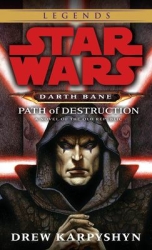
When I first opened the novel, I had idea what to expect and I didn’t even if I knew I would like the book, but that quickly changed when I became addicted to the story. With an incredible mix of action and adventure, Drew Karpyshyn’s novel: “Darth Bane: Path of Destruction” is hard to beat. Readers join an Outer-Rim miner named Dessel on his journey to morph into his true self: Darth Bane. I personally enjoyed how Drew worded this book, with specific, yet easy to read details. Alongside a captivating storyline, there is nearly non-stop Star Wars action. If any readers thirst for a special Star Wars book that does not sacrifice action with dialogue, I would highly suggest Darth Bane: Path of Destruction.
(Hungry for more Drew? Check out the sequel of this book: Darth Bane Rule of two!)
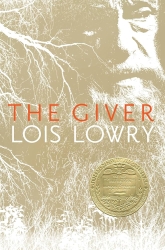
“The Giver” is a book that really stands out in a crowd. In this enchanting tale by Lois Lowry, a two-time Newberry Medal winner, a young boy named Jonas lives in a perfect society. There is no pain. No sickness. No hunger. However, when he is assigned to his job in the Community, he is singled out and given a special job. Suddenly, everything is different. Jonas is able to see things- feel things- in a way that he never has before. Can Jonas find the flaws that he was blind to before and restore life to his Community? For those who like slow, thought provoking stories, The Giver is a gem to keep on your bookshelf. Plus, it is one of four moving chapters in a quartet that avid readers are sure to enjoy.
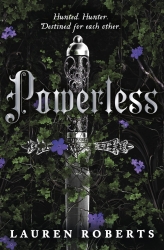
"Powerless" by Lauren Roberts is perfect for those who are huge fans of the Hunger Games series or the Red Queen series. This book involves magic, finding yourself, romance, and always, betrayals. This book will always have you on the edge of your seat and hook you from the beginning.
Paedyn Gray is an ordinary, lowlife, powerless (pun intended) thief discreetly blending in with the rest of her cruel kingdom who hates anyone just like her. Kai Azer is an elite, powerful, charming prince who has trained his entire life to hunt down people just like her. Then Paedyn gets thrown into the Purging Trials with him. The trials is a showoff to the kingdom of Ilya what powerful Elites that they have, a game practically. But Paedyn doesn't have any powers, so now she has to pretend to be psychic in front of the whole kingdom and fight her way to the top, avoiding getting killed.
This book is so good! The banter between Kai and Paedyn is to die for. It also has 2 POV so you get the ins and out of each side of the story. From the Loot, to the castles, to the arenas in the game, you will feel like your there yourself. This is also perfect those who want an easy flowing read, where there are no "boring" parts.
Reviewer Grade: 9
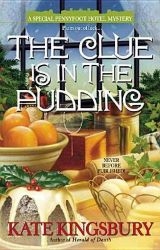
“The Clue is in the Pudding” by Kate Kingsbury is a delightful read for those who enjoy a delicious mix of bone-chilling mystery and delightful drama. In it, Cicily Baxter, owner of the Pennyfoot Hotel, is hoping to have a very merry Christmas this year. She is planning on entertaining her guests at her annual Christmas party in order to draw in business. Alas, not everything is going as planned. Her head maid has gone to visit family, and the replacement is the most opinionated, fussy, and unfriendly person she has ever met. She causes all sorts of trouble with the rest of her staff. When things seem unable to get any worse, a guest dies mysteriously in his room, and the new maid is chief suspect. However, things are not exactly what they seem, and motives begin popping up left and right amongst the guests. Can Cicily sniff out the murderer before Christmas arrives? As part of the Pennyfoot Hotel series, it may require some thinking from the reader to fill in the holes of the characters’ backgrounds if they have not read any of the other books. The plot is somewhat long, but it is worth it once the end comes! For readers who like romance, suspense, and drama all in one, this book is sure to be a real treat!
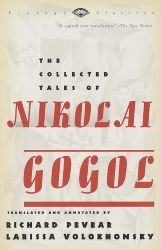
The Portrait by Nikolai Gogol is one of his best short stories centering around a penniless artist, Chartkov, struggling to make his name in the art world and finds himself entranced by a portrait he buys at a merchant shop. With a steely face, build of a giant, and eyes that seem to pierce the soul, the portrait that he buys on an impulse at a run-down shop carries a mystery with it that haunts Chartkov both in his waking hours and in his sleep. As he is overcome by his financial difficulty, the strange portrait that he stashed away for fear of its gaze changes his life forever. With flowing imagery and an intrinsic description of human nature and its afflictions, The Portrait latches onto the reader’s heart and presents them with a fascinating account of Chartkov and his peculiar encounter with the portrait with uncanny realism and blended fantasy.
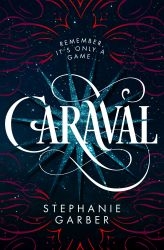
I have heard mixed reviews about this book so I kept a neutral expectation for it. This book completely broke my standards. The magic, lore, and world in the this book is so unique, creative and perfectly easy to understand and be captivated by. There were some points where I was slightly bored but I’m ever so glad I stuck through because when it did get dramatic, oh did it get dramatic. This book is perfect for those who like an equal mix of fantasy and romance and a small portion of action, of course.
The female main character is totally relatable especially for those who can relate to the role of the cautious yet extremely caring older sibling. Scarlett risks everything for her sister and she has such a big heart. Scarlett’s decisions will have you on the edge of your seat, because in this book it’s hard to forget that everything is just an act.
Speaking out for the hopeless romantics, the two main male characters, Dante and Julian, are everything! I swear I blushed a couple times because of them. The story wouldn’t be nearly the same without them.
This book will forever be engraved in my memory. You will never forget the feeling of the magical world inside Caraval and Isla de los Suenos. Even though it wasn’t 5 stars, this will definitely be in my top books of the year.
I didn’t quite understand the intensity of this repeated quote but always keep in mind, “remember it’s only a game”.
Reviewer Grade: 9
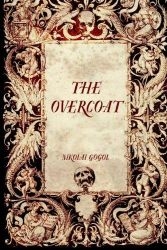
Nikolai Gogol's "The Overcoat" is a simple yet intriguing story of a man set upon buying a new overcoat despite his poverty-stricken life. Enamored with his job of copying documents at the office, Akaky never takes notice of the world around him, even when all the other workers around him gibe at his love for something so mundane as replicating documents and the intense manner of which he regards this dull job. However, he is sharply brought into reality when winter brings frigid weather, and he realizes his threadbare and tattered overcoat simply will not sustain Russia's winter. He begins his speculations into buying a new overcoat with as much zeal as he puts into his office work, yet he hardly expects what the future holds both for him and his overcoat. Both amusing and thought-provoking, Nikolai gives the reader insight into the life of an eccentric office worker laboring during the harsh winter and successfully blends farce comedy with blunt realism to create a short story that stirs the emotions and leaves the reader satisfied.
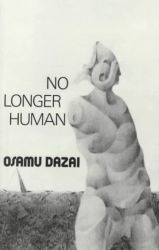
I began this book because I was interested in the author, Osamu Dazai, as some of his life and feelings were reflected in this work of literature. Overall, I enjoyed the perspective that Yozo brings on both life and humanity.
No Longer Human by Osamu Dazai is a fictional story that follows the main character, Oba Yozo, throughout his tumultuous life as he feels estranged from humanity and those around him. Yozo as a child yearns for something in life which he cannot find in the untruthful and utilitarian way that the people he is surrounded by choose to live. As he searches for what it is to be an authentic human being while battling his own disconnect from society, his view on life as a whole changes. As time progresses Yozo’s life takes a bold path, highlighted by his erratic behavior in order to “qualify as a human” as he enters college, still struggling with his fear of exposure and masking his true nature under a comedic facade. The way that Yozo is characterized brings forth a layer of depth and instills a deeper understanding of both him and human nature through his perspective. The book touches on many themes that are prevalent even in our modern-day world such as alienation from society and individual struggle of expression as well as fear of being ostracized. The story of Yozo and his wayward life is intriguing, and I think that one of the reasons that it is still widely read and appreciated both in the West and in Japanese literature is because Yozo brings out the things in people which often are hidden away, revealing some of what it is to be human. His account as he goes through life also adds a refreshing take to things often perceived as mundane, inviting the reader to muse upon them and form their own opinion themselves. However, I was not able to fully enjoy the book because of the overly cynical view it took on life especially towards the end of the story which I believe is a reflection of the author’s similarly deteriorating life.
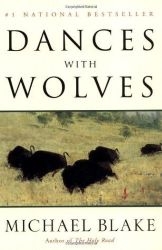
A novel about a civil war veteran alone (or at least he thinks he is) in the American frontier, Dances With Wolves is an exciting adventure story about belonging and acceptance for those different from you set in the 1860s. Lieutenant Dunbar, the main character, must come to terms with his Native American neighbors, his internal struggles, and his own past.
I enjoyed this book a lot more than I was expecting to, and it even made me laugh out loud several times. I really liked the description and the way Blake writes. I would recommend this book to anyone aged eleven or twelve and above, because of violence and one or two adult themes, though all of it is done very tastefully. Although technically there are no cowboys in this story, this book had a cowboy kind of feeling because of its setting and the characterization of Dunbar. It was quite entertaining and versatile. It is somehow both a lighthearted book and an in-depth commentary on how relationships define us as members of the same species, despite cultural boundaries and mentalities.
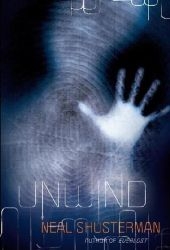
What if your parents could choose to just ... get rid of you? If their child is 13-18 years old, the parents in this book can. The children are put to good use, essentially used as organ donors for those who need it. This young-adult novel details the adventures of Connor, Risa, and Lev, three children who were chosen to be unwound. This was for different reasons in different situations, but it results in their lives being thrown together on the same path.
Shusterman is very good at creating realistic, living characters that interact in a detailed web of situations and settings. I would recommend this book to anyone, but warn that some of the scenes can be scary for those who don't do well with too much suspense. Every part of it was engaging, and it manages to perfectly add philosophy and moral dilemma to an excellent story without compromising the believability or soul of the book. This is definitely worth a read, and it is the first installation of a series, so if you enjoy it as much as I do, check out the rest.
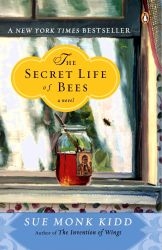
This book is about a motherless fourteen year old white girl named Lily. She must learn to overcome her own prejudice and grief, in addition to her struggles at home, which would not be possible without the help of three African-American beekeeper sisters and their unwillingness to give up on her. Although there is some adventure (there are conflicts with racists and Lily's father), mostly this book is a coming-of age novel and about Lily's search for a place where she belongs, growing up in the American South of 1964.
I personally strongly disliked this book, because I found the main character insufferable, but I can appreciate the writing style and
the thoughtfulness that was put into it. If you are looking for a coming-of-age story in which the writing is very descriptive and honest, maybe this book is for you.
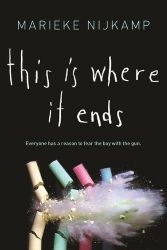
If I could recommend any book I've ever read, its this one. This book is a minute by minute recount of a school shooting at a high school, which as a teenager in America, feels like a very real situation that can feel almost bound to happen. The storytelling is unparalleled, and as a reader I felt as if I was in that high school, sitting on the bleachers, waiting to see what was going to happen next. It has such good raw emotion- fear, anger, sadness, terror. From the second I started reading I could not put it down, and by the end you feel neither unsatisfied nor satisfied, just as I believe the author intended. It does cover a very dark topic, and is very descriptive, so be careful if you are sensitive to that kind of material.
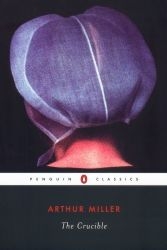
The Crucible was a book I enjoyed simply because it is all a big metaphor. Even though the book is set at the time of the Salem Witch Trials, it is actually the author's views on the Red Scare in the US and "Mccarthyism". I love the character development throughout the story, and Miller truly makes them all come alive. The decisions they make, especially Proctor's, are very relatable and do not feel forced, which pushed me to keep reading. It is a beautiful play that takes a dark time in America to explain another dark time, and its use of rhetorical devices and fantastic writing makes it incredibly valuable.
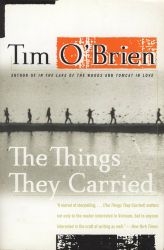
The Things They Carried was a book I had to read for school, but one I started to enjoy. I love the way the author uses very descriptive language to portray every setting and character, making you feel like you are right there with them. The book does a greta job at addressing various moral dilemmas in society and how the "societal rules" change during times of peace and war. Overall this book was not my preferred genre, however the writing is superb and it is a great book to challenge thinking. While it may be hard to relate to characters at times, it definitely makes you stop and think about yourself and where you are.